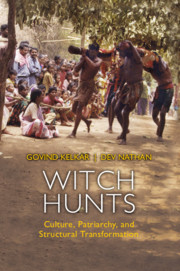Crossref Citations
This Book has been
cited by the following publications. This list is generated based on data provided by Crossref.
Gershman, Boris
2021.
Witchcraft Beliefs, Social Relations, and Development.
SSRN Electronic Journal ,
Mezzadri, Alessandra
2022.
The Social Reproduction of Pandemic Surplus Populations and Global Development Narratives on Inequality and Informal Labour.
Development and Change,
Vol. 53,
Issue. 6,
p.
1230.
Gershman, Boris
2022.
Witchcraft Beliefs Around the World: An Exploratory Analysis.
SSRN Electronic Journal ,
Gershman, Boris
2022.
Handbook of Labor, Human Resources and Population Economics.
p.
1.
Gershman, Boris
and
Proto, Eugenio
2022.
Witchcraft beliefs around the world: An exploratory analysis.
PLOS ONE,
Vol. 17,
Issue. 11,
p.
e0276872.
Nathan, Dev
Kelkar, Govind
and
Govindnathan, Pallavi
2022.
Knowledge economy and gender inequality.
Gender, Technology and Development,
Vol. 26,
Issue. 3,
p.
341.
Kelkar, Govind
Sinha, Sarika
and
Nathan, Dev
2022.
Social Exclusion and Policies of Inclusion.
p.
93.
Peacey, Sarah
Campbell, Olympia L. K.
and
Mace, Ruth
2022.
Same-sex competition and sexual conflict expressed through witchcraft accusations.
Scientific Reports,
Vol. 12,
Issue. 1,
Gershman, Boris
2023.
Handbook of Labor, Human Resources and Population Economics.
p.
1.
Gershman, Boris
2023.
Witchcraft Beliefs and Subjective Well-Being.
SSRN Electronic Journal,
Brunnekreef, Jolanda
2023.
“The Witch’s Mirror”: A Review of Scholarship on Witchcraft and a Reassessment Based on the Intersectional Lived Experiences of Dalits and Adivasis.
Religions,
Vol. 14,
Issue. 3,
p.
401.
Bleie, Tone
2023.
Indigenous Peoples and Borders.
p.
41.
Nathan, Dev
Rahul S.
and
Kelkar, Govind
2023.
After the Long Walk Home…the Gendered Rural Safety Net.
Agrarian South: Journal of Political Economy: A triannual Journal of Agrarian South Network and CARES,
Vol. 12,
Issue. 2,
p.
227.
Bhanye, Johannes
2023.
‘Emerging forms of spatialised and socialised authority’ among ‘tenure-insecure peri-urbanites’ in African peri-urban spaces.
Pan-African Conversations,
Vol. 1,
Issue. 2,
p.
26.
Amo-Adjei, Joshua
Essuman, Ruth
Nurzhynska, Anastasiia
Deliege, Antoine
Sharma, Geeta
Iddrisu, Iddi
Nikoi, Charity
and
Rao, Chythra R.
2023.
Experiences of parents and stakeholders in caring for, and supporting children with special needs in Ghana.
PLOS ONE,
Vol. 18,
Issue. 3,
p.
e0281502.





